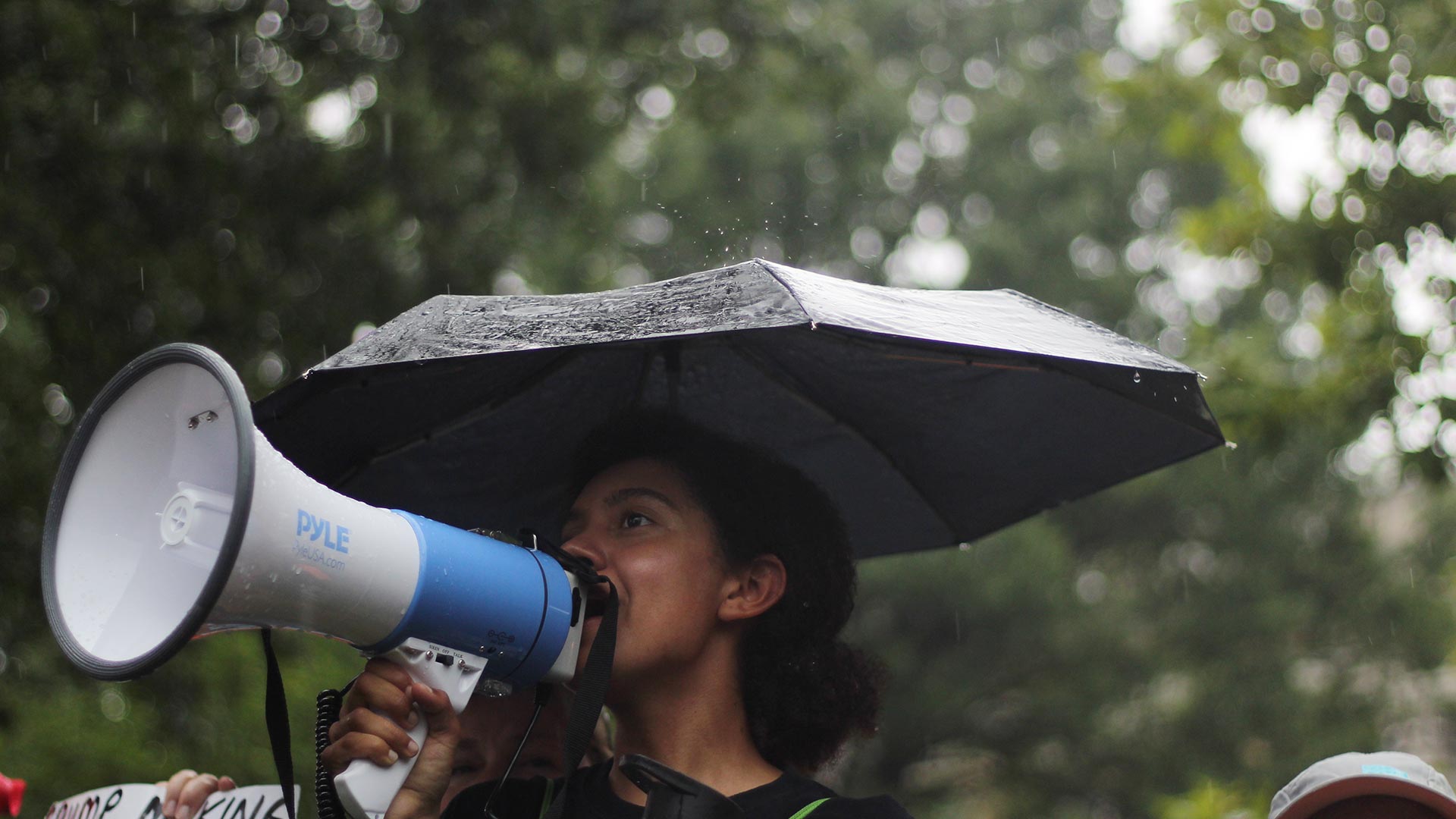We recently shared a reflection from David Rice about the need for empathy and openness in a culture marked by division. Often, though, calls for “civility” are used to silence or negate feelings of grief and anger directed toward historic, pervasive harm and injustice. As social movements like #MeToo and #TimesUp give voice to those feelings—particularly women’s anger—we are witnessing fierce backlash from a system that has long sought to stifle and condemn feminine anger. Here, Assistant Instructor Jennifer Fernandez writes that anger is not just a social or political necessity; it is in line with a long line of prophetic theological thought that speaks truth to power and celebrates the dignity and humanity of all.
As a PhD student it’s rare for me to pick up a book at a bookstore that’s “for fun.” Don’t get me wrong, the work I’m doing for my PhD is a certain kind of fun, but it’s a fun that makes for a lot less leisurely reading. That said, on a recent trip to a bookstore my eye was drawn to the new nonfiction table and a fire engine red book jacket that read in blazing white letters, “Rage Becomes Her: The Power of Women’s Anger.” Uhm…yes please.
Flipping through the book I was reminded of a comment I made recently in Dr. Kj Swanson’s “God, Gender, & Sexuality” class when talking about some of the queer and feminist theologies we had assigned. I said something along the lines of “Reading this stuff should make you angry,” and what followed was a cathartic expression from a few of the women in class about the tears they shed, the frustration they felt, and the resilience they found when doing the week’s reading. Another book released just this month, Good and Mad: The Revolutionary Power of Women’s Anger rounds out this year’s publications on the topic, with Eloquent Rage: A Black Feminist Discovers Her Superpower having opened the year. There definitely seemed to be a theme forming.
And so, as I look through my newsfeed filled with protests, marches, and hashtags and as I witness the litany of books and articles being written on the subject, I think it’s important to name that current expressions of women’s anger aren’t just something political or cultural, they’re theological. Women are making use of their prophetic voices to point to larger issues of dignity, worth, respect, and they are pointing to these issues with rage and frustration because for too long they have been told to be passive and deferential, and for too long they have been prisoners to a system they didn’t create and which never accounted for the fullness of their humanity.
There is an abundance of women throughout history that have done amazing prophetical work beyond those who have been historically pointed to, and I believe that we are witnessing some of that powerful prophetic work today. As we look at the Kavanaugh hearing protests, at the multitude of #Metoo and #TimesUp posts, and as we look at how women continue to march across the globe for reproductive justice, racial equality, and other human dignities, I contend that women are using their anger to strengthen their prophetic voices. They are demanding the reconstruction of human relations, and that’s powerful stuff. It’s also dangerous stuff if you’re in the crosshairs. In Rage Becomes Her author Soraya Chemaly explains, “Women’s anger is usually disparaged in virtually all arenas, except those in which anger confirms gender-role stereotypes about women as nurturers and reproductive agents. This means we are allowed to be angry but not on our own behalves. If a woman is angry in her ‘place,’ as a mother or a teacher, for example, she is respected, and her anger is generally understood and acceptable. If however, she transgresses and is angry in what is thought of as a men’s arena—such as traditional politics or the workplace—she is almost always penalized in some way.”1 We’ve been witness to this penalization time and again, most recently in the mocking of a sexual assault victim and countless victims like her during a political rally.
“Women are using their anger to strengthen their prophetic voices. They are demanding the reconstruction of human relations.”
In Sexism and God-Talk Rosemary Radford Ruether explains that “feminism sees what male prophetic thought had not seen: that once the prophetic norm is asserted to be central to Biblical faith, then patriarchy can no longer be maintained as authoritative.”2 There is something at work in the current expressions of women’s anger, something to be in awe of because it points to something huge. Argentinian social scientist Verónica Gago examines the power of protest, specifically those of women in light of the rampant femicides in Buenos Aires. Part of the Ni Una Menos (Not One More) movement, Gago explains that the global surge of women’s movements can be directly correlated to issues of economic and social justice. Further, current women’s movements offer a radical critique to the paternalism found in old ways of understanding how we are to care for one another. Women therefore, through their anger, are pointing beyond patriarchal distortions towards a vision of the world where everyone is heard, and seen, and where all can thrive.
As a culture we’ve been conditioned to see anger as something destructive, poisonous, and ultimately harmful, and it certainly can be all those things. I and others writing about women’s anger aren’t ignorant to the ways that as an emotion, anger can scorch and burn. But for women, anger can be a matter of epistemic justice—we know what we feel, and we should get to feel it—and what’s more, we should get to express it. Again, as Chemaly explains, “Anger has a bad rap, but is actually one of the most hopeful and forward thinking of all our emotions. It begets transformation, manifesting our passion and keeping us invested in the world. It is a rational and emotional response to trespass, violation, and moral disorder. It bridges the divide between what ‘is’ and what ‘ought’ to be, between a difficult past and an improved possibility.”3 Let us move forward in these troubled times allowing for all the feelings—the hope, the despair, and the anger friends, for in doing so we make full use of our prophetic voices, allowing for the divine to break forth with searing brilliance.
1Soraya L. Chemaly, Rage Becomes Her: the Power of Women’s Anger (New York: Atria Books, 2018), xvii.
2Rosemary Radford Ruether, Sexism and God-talk: Toward a Feminist Theology, 10th ed. (Boston: Beacon Press, 1993), 24.
3Chemaly, xx.


